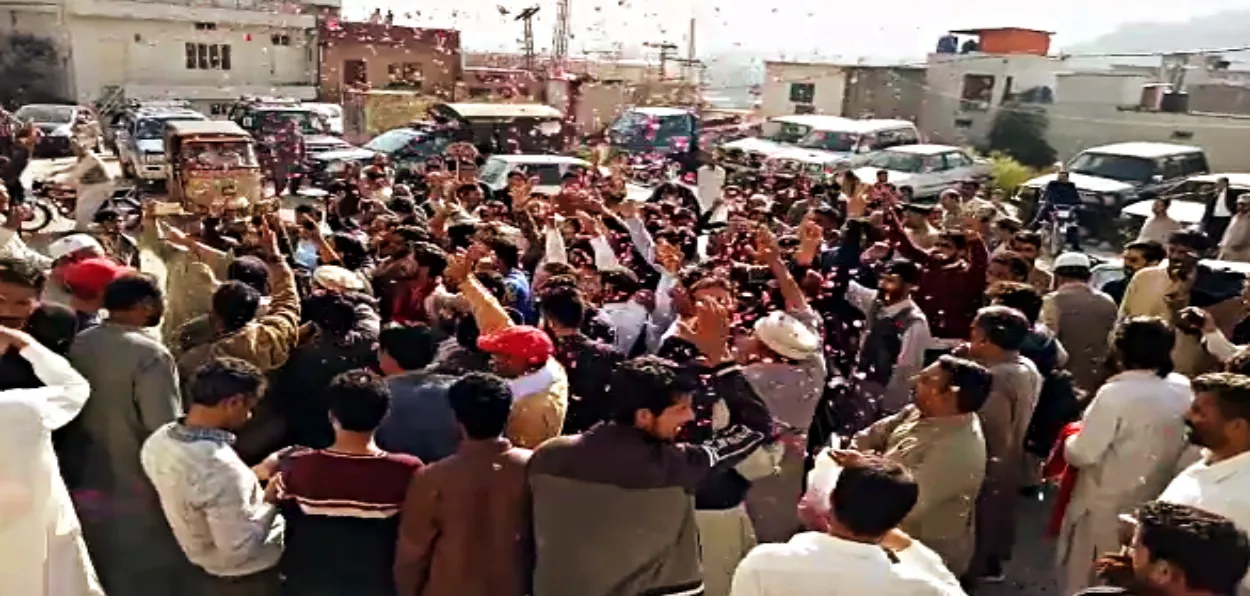
D. P. Srivastava
Pakistan raises the issue of Kashmir on all conceivable occasions. Shehbaz Sharif raised it in his inaugural speech as the second-time elected prime minister. However, Pakistan remains silent on the situation within the POK and Gilgit-Baltistan. The region has been in ferment for more than a year. In May 2023, people started a sit-in against rising flour and electricity prices. This was followed by protests against high electricity bills. A Joint Awami Action Committee has been formed and the movement has gone beyond the Poonch to Mirpur and Muzaffarabad.
The POK and Gilgit-Baltistan are part of the erstwhile Indian state of J&K. While J&K was split into two Union Territories in 2019, Pakistan divided the area under its illegal control more than seven decades ago. It took over direct administration of Northern Areas, which constitutes 85% of the territory, while POK is only a rump with the remaining 15%. Since then, the Northern Areas have been renamed Gilgit-Baltistan to obscure its origin as part of J&K and weaken its lien with POK.
The Pakistani version of history keeps changing. The current narrative mentions that the Northern Areas were separated from POK under the Karachi Agreement of 1949. The agreement was allegedly signed by the Pakistan government with representatives of POK.
The POK President Sardar Ibrahim, who was supposedly one of the two signatories, later claimed that he never signed the agreement. The other signatory, Chaudhary Ghulam Abbas, Muslim Conference Chairman, also distanced himself from the Karachi Agreement. The document most likely was forged by Pakistan to justify its alleged takeover of the bulk of the territory of the POK.
This was absorbed in Pakistan without a plebiscite. This was kept secret since Pakistan had changed the territorial status quo without a plebiscite. This became public in a landmark judgment of the POK High Court in 1993, which described Pakistani actions as a violation of the UN Security Council resolutions. The High Court asked Pakistan to return the territory to the POK. Pakistan got the High Court’s judgment overturned by the POK Supreme Court on purely procedural grounds.
The POK as well as the Northern Areas were run by Pakistan’s Ministry of Kashmir Affairs for more than two decades. The first election based on universal franchise took place in 1970. The region was bestowed with an ‘Interim’ Constitution in 1974. This made little change in the power compact. although an elected legislature and ‘elected government’ came into being yet neither had real powers.
All the power was vested in Kashmir Council headed by Pakistan’s Prime Minister. More than four decades later, there is little change in the power equation between Islamabad and Muzaffarabad, the capital of POK. Though the Kashmir Council has been relegated to an advisory role under the 13th amendment of the POK constitution, its powers have not been directly transferred to the elected assembly.
Instead, Pakistan has assumed direct powers over 32 subjects under POK’s constitution. Legislation on the remaining 22 subjects can also be initiated only with Pakistan’s consent. This far-reaching change was made a year before the whittling down of Article 370 by India. While India was criticized, Pakistani action went unnoticed.
The situation in Gilgit-Baltistan is far worse. Army given its strategic importance; is more tightly controlled by the Pakistan Army. This is the region that touches China and Afghanistan. Without Pakistani control of POK, there would have been no CPEC (China-Pakistan Economic Corridor). This is also the area where the Indus River enters Pakistan and provides this agrarian country bulk of its water requirements. While POK got an ‘interim’ constitution in name in 1974, GB is still run based on administrative ‘Orders’ issued by Islamabad.
Under the Gilgit-Baltistan Order of 2009, the GB Assembly was given limited powers of legislation over 61 subjects. The entire list of 61 subjects was abolished under the GB Order of 2018. Massive protests and a copy of the ‘Order’ were torn in the presence of Pakistan’s Prime Minister Shah Khaqan Abbasi in the regional Assembly. It was challenged in the Gilgit-Baltistan Supreme Judicial Council and set aside. The Pakistan Supreme Court restored the Order against which the people of the territory were protesting!
ALSO READ: Why Shahpur Kandi dam is not India’s water terrorism against Pakistan
POK and GB hold periodic elections. These elections are meaningless because elected assemblies in the two territories have no powers. The electoral exercise is tightly controlled. Regional parties are completely decimated, and the two Assemblies are controlled by Pakistan’s mainstream parties. This is in sharp contrast to the situation in the Union Territory of J&K where regional aspirations are expressed largely through regional parties. The Muslim Conference, which had demanded that J&K should join Pakistan in 1947 won 1 seat in the 53-member legislature of POK in the last elections in 2021. JKLF, which supports the ‘independence’ option has never been allowed to participate in elections in either POK or G-B. They were used to start the campaign of terrorist violence in the Indian state of J&K in the name of ‘Azadi’. ‘Azadi’ has no place on the other side of the Line of Control.
D P Srivastva is a former Ambassador and author of the book, Forgotten Kashmir: The Other Side of the Line of Control
